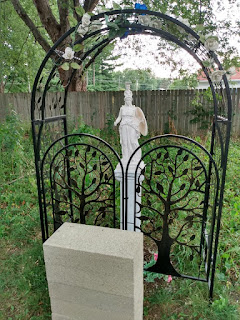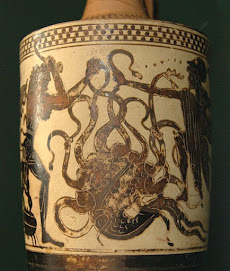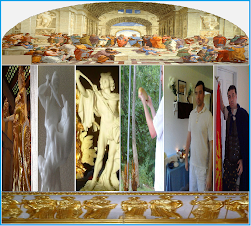 |
| Two Greek Sphinxes Guard a Modern Hellenic Shrine. |
The concept of requesting the aid of Power Animals is something that has always fascinated me about polytheism and paganism. However, it's not normally in the modern ancient Greek religion. Other than the protection of a place or object, like a Sphinx guarding a temple or a lion protecting a tomb, they're not normally invoked for personal companionship.
However, in my own life, I have entertained the thought of slightly changing that in ways that would not contradict Hellenism, no more than it would be to ask the permission of any free willed being in the proper respects.
Of course, one of the great things about Power Animals, perhaps for lack of a better term, is that they don't have to necessarily be tied to one culture or another exclusively. For example, one of my prominent ones is the turtle or tortoise. Most certainly connected with Hermes, but also found in more places than just Greece, and is great for protection, patience, and observance. They just close up in their armor and nothing can penetrate. But my strong character is also reflected in my most culturally significant animal, the Greek Gryphon.
It's worth saying that many of the most extraordinary animals in Greek culture were not friendly, which is probably why there's never been any real effort at creating relationships with them. They're beings that are not going to show up for tea parties, or have much interest, if any, in human affairs. Most animistic or hybrid creatures in Greek myth wreaked havoc on humanity and were killed by Heroes. However, there were normally some among them who were either helpful or had the ability to exist in their own individual way. For example, the Sphinx that Oedipus encountered wasn't friendly at all, but other Sphinxes guard temples and sacred areas that are valued by humans. Therefore, the goal is to find the unique ones.
Since we're on the topic, let's start with the Greek Sphinx. Notice that I call these magnificent creatures in the Greek version and context, because while they permeate other cultures, the Greek is unique and extraordinary in its own right, and usually easy to identify through appearance, posture, sharpness, functions and myths. For instance, the Greek Sphinx is not to be confused at all with the Egyptian.
This beautiful animal is composed of the wings of an eagle, the body of a lion (usually female), a serpent tail, and the head of a human. Its wings and body represent Heaven and Earth, and the human head makes it possible to communicate the wisdom of both realms to mankind. This is why they are so wise yet also challenging for humans to comprehend. While they can talk to us, humans are far from being masters of universal competency. Remember, only someone exceptional, like Oedipus, was able to solve the riddle that liberated Theban Greece.
When standing in the protection of a place or person, a Greek Sphinx is a powerful and deadly ally. The aggression alone that it can bring against a spiritual or energetic intruder is beyond measure. Its razor claws and venomous tail will bring instant death or severe injury. I highly doubt that an invader would look forward to the battle. Successfully invoke one, and whatever is against you will play hell getting through.
The thing to remember with a Sphinx, as with any being of higher power, is respect and humility. If you try to gain their favor through force, coercion or control, they'll ignore you at best. At worst, they might smack you one good time, which you don't want considering the paws they have. Even if you do successfully gain their alliance, they can still leave of their own accord. To request, kindly give a sacrifice to the Gods and ask them to send one that would consent to protecting and guarding you. Then you might also go into meditation to meet and create a relationship. But be prepared, the Sphinx may test you.
Next, let's discuss the Greek Gryphon, which has the lower body of a lion, and the head, wings and talons of an eagle. A little less ferocious than the Sphinx perhaps, but still extremely dangerous and deadly to enemies. The depiction of the Greek Gryphon goes all the way back to Minoan Crete in the palace of Knossos. Mainly, they are guardians of precious things. The Gryphon is also the sacred animal of my temple, which is why the priests and priestesses wear a metal Gryphon in the center of the laurel on their shoulder sashes.
When I call on the Gryphon, I will normally feel its giant, majestic wings wrap around me and its magical powers and strength fill the atmosphere. Then there is no fear or danger, only power and confidence. But I also find myself in a bit of an easy spot because the Gryphon chose me instead of the other way around. It came to me at the very beginning of my studies into the old religions, before I even became a Hellenist. So they have always been there, and all I have to do is make a verbal request, "I call upon the power of the Gryphon." For other people, however, it may not be that simple.
As I said in the description, Gryphons guard that which is precious and rare. They would therefore be lovers of items that are beautiful and valuable, which makes their presence even better because Greek spiritual relationships thrive on reciprocity. So what precious things do you have in your home or possession? It doesn't only have to be gold, silver, bronze, diamonds or monies. Your entire family and home can be precious and beautiful to you.
Take some of your most beautiful and valuable inanimate objects and set aside a special place for them, like an altar, shrine or even a temple structure for the Gryphon who decides to come and claim them, and place the valuables there as gifts in return for their protection. It also doesn't have to be a one time gift, and probably shouldn't be. You can build upon it by adding more beautiful things for the Gryphon over time. Even something as simple and beautiful as a store bought charm. The more you reinforce something, the stronger it becomes.
Finally, I'd say that one of my favorite creatures of Greek religion is the majestic horse Pegasos. I would say he is a universal animal to the Greeks for assistance in animal power. He would be to the Greeks what Excalibur is to Arthur, only far cooler and exceptionally stronger.
The winged Stallion helped Hellenes like Bellerophon complete their quests into Heroism and kill vicious monsters. Pegasos, whose name means "Sprung Forth," was born from the blood of the infamous Medusa when Perseus severed her head off. The great Steed came as the horse of the Gods, and has since been a favorite of Zeus. Originally, Pegasos was completely untamed and therefore only Gods could control him. Of course, Bellerophon changed that, but even He required Divine assistance to do so. Without Pegasos, He would not have been able to defeat the Chimera.
Some say that Pegasos now holds the thunderbolt of Zeus, or that he is the horse of thunder and lighting itself directed by Zeus. Others say that Pegasos is one of the horses of Eos, Goddess of the dawn. Pegasos greatly aided in the destruction of chaos and evil, so it may not be a surprise that his image was also used by Allied Paratroopers in World War II, as they fought to defeat the Axis of Evil. Pegasos has always been harnessed by good people and those favored by the Gods for the sake of vanquishing that which is not good.
Pegasos also has personal powers of his own. He was credited for creating the Spring of Hippocrene on Mount Helicon by simply stomping his feet. He holds the power of flight, creation of life itself, and with him he brings the presence and favor of Gods.
In closing this section, I will list animals connected with The Olympian Gods, that they may send to us as protectors, defenders and helpers.
Zeus - Eagle
Hera - Peacock
Aphrodite - Dove
Poseidon - Seahorse
Demeter - Gecko
Artemis - Deer
Apollon - Lion
Athena - Owl
Hephaistos - Crane
Hermes - Tortoise
Dionysos - Leopard
In the Goodness of the Gods,
I'll see you at the next Herm down the road,
Chris Aldridge.











